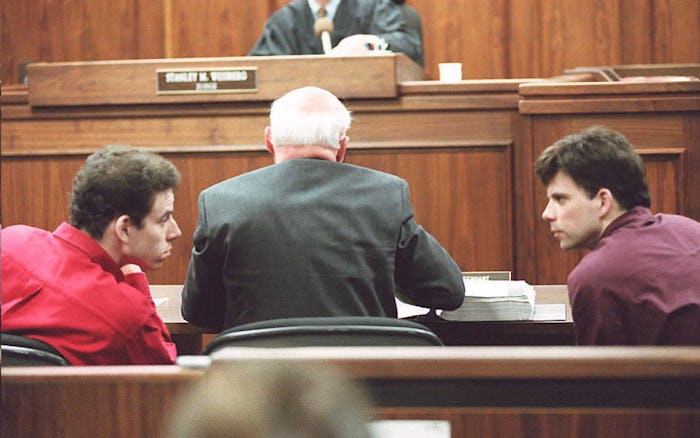Entertainment

The Menendez Brothers' Case Puzzled The Jury
When Lyle and Erik Menéndez were brought to trial for the 1989 murder of their parents, the case was far from cut-and-dry. The intense amount of media coverage was a factor in how things unfolded, as was the differing strategies of the defense and prosecution. The prosecution insisted that the brothers had acted out of greed and hatred, whereas the defense told a story of lifelong abuse and fear that culminated in murder. Opinions were so mixed when it came to determining the truth that it's no surprise the trial resulted in a deadlocked jury. But what is a deadlocked jury?
A deadlocked jury can also be referred to as a hung jury, and simply means that after much deliberation the jury was unable to decide on a verdict and charges. This can be especially difficult in criminal cases, as the Menéndezs' was, because the decision has to be unanimous. If the jury cannot come to a conclusion, then that would result in a mistrial, which means the case would be retried with an entirely new jury. This could be beneficial to the person standing trial because even though they were not acquitted, they weren't convicted either. A hung jury resulting in a mistrial gives them the chance to try again, which is much easier than overturning a conviction.
This is what happened in the first trial of the Menéndez brothers. Though they were tried together in their initial trial, they both had their own legal teams and two juries – one for each of them. After the six month trial, both juries deadlocked. Part of the problem was that in a criminal case, one must prove murder beyond a shadow of a doubt, and there was some discussion about whether or not the brothers should actually be charged with manslaughter. First-degree murder implies intent to commit harm, but manslaughter does not.
District Attorney Gil Garcetti (remember him from the O.J. Simpson trial?) was determined to pursue first-degree murder charges, but this put a higher burden of proof on the prosecution and some jurors felt they just didn't have enough proof. This led to jurors being unable to decide between first-degree murder, second-degree murder, and either voluntary or involuntary manslaughter. The mistrial meant that the Menéndez brothers got a second chance to try their case.
They were not so lucky the second time. The second trial, unlike the first, was not televised and had only one jury. In that trial, Lyle and Erik Menéndez were convicted of murder and sentenced to life in prison, a sentence they are still carrying out today.